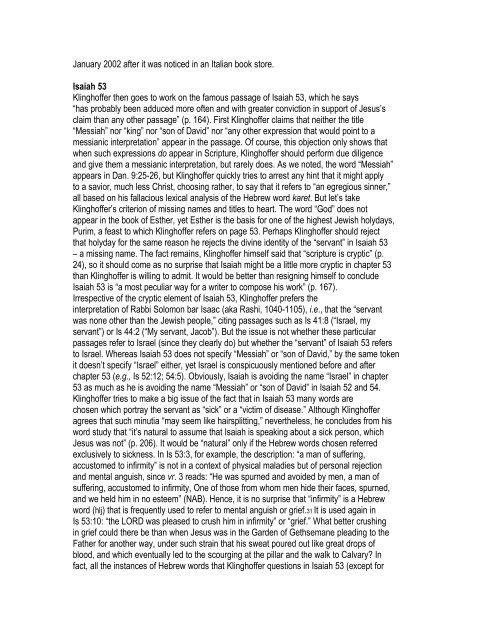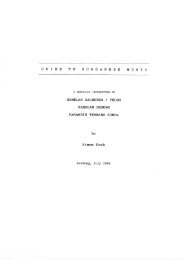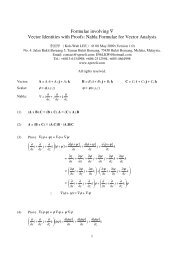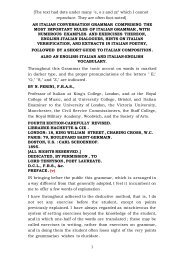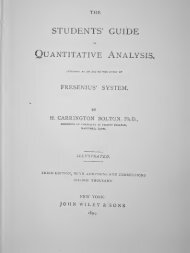Why the Jews Rejected Jesus - Free EBooks Library
Why the Jews Rejected Jesus - Free EBooks Library
Why the Jews Rejected Jesus - Free EBooks Library
Create successful ePaper yourself
Turn your PDF publications into a flip-book with our unique Google optimized e-Paper software.
January 2002 after it was noticed in an Italian book store.<br />
Isaiah 53<br />
Klinghoffer <strong>the</strong>n goes to work on <strong>the</strong> famous passage of Isaiah 53, which he says<br />
“has probably been adduced more often and with greater conviction in support of <strong>Jesus</strong>’s<br />
claim than any o<strong>the</strong>r passage” (p. 164). First Klinghoffer claims that nei<strong>the</strong>r <strong>the</strong> title<br />
“Messiah” nor “king” nor “son of David” nor “any o<strong>the</strong>r expression that would point to a<br />
messianic interpretation” appear in <strong>the</strong> passage. Of course, this objection only shows that<br />
when such expressions do appear in Scripture, Klinghoffer should perform due diligence<br />
and give <strong>the</strong>m a messianic interpretation, but rarely does. As we noted, <strong>the</strong> word “Messiah”<br />
appears in Dan. 9:25-26, but Klinghoffer quickly tries to arrest any hint that it might apply<br />
to a savior, much less Christ, choosing ra<strong>the</strong>r, to say that it refers to “an egregious sinner,”<br />
all based on his fallacious lexical analysis of <strong>the</strong> Hebrew word karet. But let’s take<br />
Klinghoffer’s criterion of missing names and titles to heart. The word “God” does not<br />
appear in <strong>the</strong> book of Es<strong>the</strong>r, yet Es<strong>the</strong>r is <strong>the</strong> basis for one of <strong>the</strong> highest Jewish holydays,<br />
Purim, a feast to which Klinghoffer refers on page 53. Perhaps Klinghoffer should reject<br />
that holyday for <strong>the</strong> same reason he rejects <strong>the</strong> divine identity of <strong>the</strong> “servant” in Isaiah 53<br />
– a missing name. The fact remains, Klinghoffer himself said that “scripture is cryptic” (p.<br />
24), so it should come as no surprise that Isaiah might be a little more cryptic in chapter 53<br />
than Klinghoffer is willing to admit. It would be better than resigning himself to conclude<br />
Isaiah 53 is “a most peculiar way for a writer to compose his work” (p. 167).<br />
Irrespective of <strong>the</strong> cryptic element of Isaiah 53, Klinghoffer prefers <strong>the</strong><br />
interpretation of Rabbi Solomon bar Isaac (aka Rashi, 1040-1105), i.e., that <strong>the</strong> “servant<br />
was none o<strong>the</strong>r than <strong>the</strong> Jewish people,” citing passages such as Is 41:8 (“Israel, my<br />
servant”) or Is 44:2 (“My servant, Jacob”). But <strong>the</strong> issue is not whe<strong>the</strong>r <strong>the</strong>se particular<br />
passages refer to Israel (since <strong>the</strong>y clearly do) but whe<strong>the</strong>r <strong>the</strong> “servant” of Isaiah 53 refers<br />
to Israel. Whereas Isaiah 53 does not specify “Messiah” or “son of David,” by <strong>the</strong> same token<br />
it doesn’t specify “Israel” ei<strong>the</strong>r, yet Israel is conspicuously mentioned before and after<br />
chapter 53 (e.g., Is 52:12; 54:5). Obviously, Isaiah is avoiding <strong>the</strong> name “Israel” in chapter<br />
53 as much as he is avoiding <strong>the</strong> name “Messiah” or “son of David” in Isaiah 52 and 54.<br />
Klinghoffer tries to make a big issue of <strong>the</strong> fact that in Isaiah 53 many words are<br />
chosen which portray <strong>the</strong> servant as “sick” or a “victim of disease.” Although Klinghoffer<br />
agrees that such minutia “may seem like hairsplitting,” never<strong>the</strong>less, he concludes from his<br />
word study that “it’s natural to assume that Isaiah is speaking about a sick person, which<br />
<strong>Jesus</strong> was not” (p. 206). It would be “natural” only if <strong>the</strong> Hebrew words chosen referred<br />
exclusively to sickness. In Is 53:3, for example, <strong>the</strong> description: “a man of suffering,<br />
accustomed to infirmity” is not in a context of physical maladies but of personal rejection<br />
and mental anguish, since vr. 3 reads: “He was spurned and avoided by men, a man of<br />
suffering, accustomed to infirmity, One of those from whom men hide <strong>the</strong>ir faces, spurned,<br />
and we held him in no esteem” (NAB). Hence, it is no surprise that “infirmity” is a Hebrew<br />
word (hlj) that is frequently used to refer to mental anguish or grief.31 It is used again in<br />
Is 53:10: “<strong>the</strong> LORD was pleased to crush him in infirmity” or “grief.” What better crushing<br />
in grief could <strong>the</strong>re be than when <strong>Jesus</strong> was in <strong>the</strong> Garden of Gethsemane pleading to <strong>the</strong><br />
Fa<strong>the</strong>r for ano<strong>the</strong>r way, under such strain that his sweat poured out like great drops of<br />
blood, and which eventually led to <strong>the</strong> scourging at <strong>the</strong> pillar and <strong>the</strong> walk to Calvary? In<br />
fact, all <strong>the</strong> instances of Hebrew words that Klinghoffer questions in Isaiah 53 (except for


